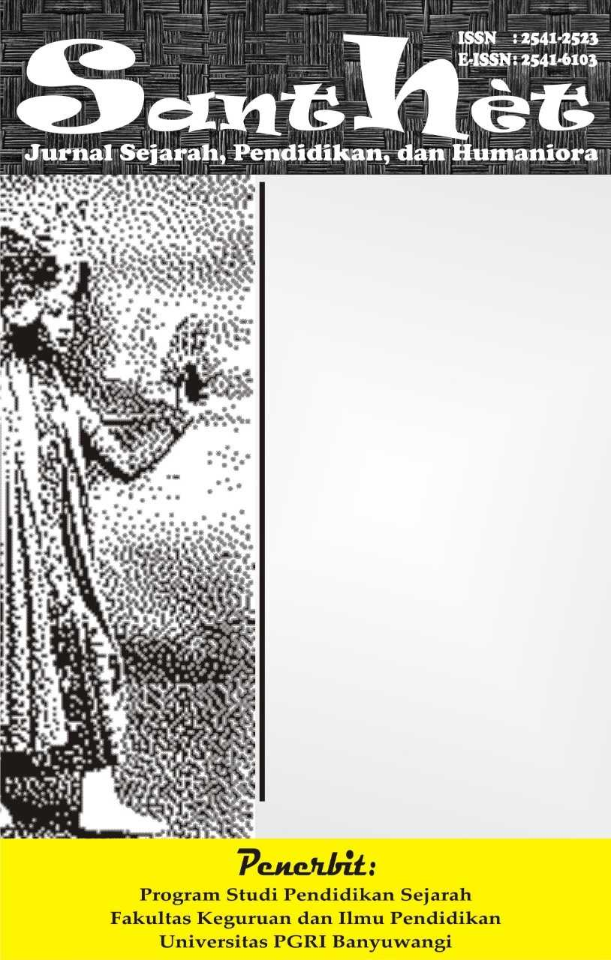The Cheng Beng Tradition in Indonesian Chinese Ethnic Communities: The Psychological Construct of Spirituality, Emotional Well-Being, and Social Identity
DOI:
https://doi.org/10.36526/santhet.v8i2.4068Keywords:
Cheng Beng, Psychological Construct, Spirituality, Emotional Well-Being, Social IdentityAbstract
“Cheng Beng” is an annual tradition carried out by ethnic Chinese people in Indonesia to honor their ancestors by visiting cemeteries to clean the graves and make offerings. This research explores the psychological constructs related to the Cheng Beng ceremony using a qualitative method with a narrative literature study approach. The data were collected through interviews and literature review, with subjects selected using purposive sampling. Three themes emerged from the interviews: the implementation of the Cheng Beng tradition, its meaning, and changes in its implementation of Cheng Beng. The literature review revealed the themes of respecting ancestors, strengthening family bonds, and enhancing relationships with other ethnic groups. The psychological constructs explored in this research are spirituality, emotional well-being, and social identity. Participating in the Cheng Beng tradition fosters a spiritual connection with ancestors, enhances emotional well-being by helping individuals cope with feelings of loss, connects to the family who have died. Participating in this ceremony strengthens one’s connection to Chinese culture and family history, which in turn strengthens their social identity as members of the Chinese community.
References
Das, K. V., Jones-Harrell, C., Fan, Y., Ramaswami, A., Orlove, B., & Botchwey, N. (2020). Understanding subjective well-being: Perspectives from psychology and public health. Public Health Reviews, 41(25), 1–32. https://doi.org/10.1186/s40985-020-00142-5
Feriyanti, Y. G., Costa, R. O., & Gunawan, M. (2022). Symbolic interaction of the chinese community in chengbeng (sembahyang kubur) cultural rituals (study on the ethnic society of china belinyu bangka belitung). Budapest International Research and Critics Institute (BIRCI-Journal) Humanities and Social Sciences, 5(1), 829–836.
Guo, L., & Yang, X. (2022). Qingming meeting and cemetery ceremony in linshui county. Cross-Cultural Communication, 18(1), 73–77.
Hairil, Suhaeb, F. W., & Ismail, A. (2023). Identitas budaya di era globalisasi. Jurnal Ilmu Sosial dan Pendidikan (JISIP), 7(3), 2145-2150.
Handy, M. R. N., Mutiani, Putra, M. A. H., Jumriani, & Rahman, A. M. (2021). Cultural acculturation of china: Etnographic study in banjarmasin. SOCIUS: Jurnal Pendidikan Dan Pembelajaran Ilmu Pengetahuan Sosial, 10(2), 65–74.
Hartai, C. D., & Gunawan, H. G. (2017). Strategi adaptasi orang tionghua bekasi dalam upacara chengbeng. Prosiding Seminar Hasil Penelitian, 5(1), 1–12.
Herman, Murni, S. M., Sibarani, B., & Saragih, A. (2019). Structures of representational metafunctions of the “cheng beng” ceremony in pematangsiantar: A multimodal analysis. International Journal of Innovation, 8(4), 34–46.
Horie, N. (2016). Continuing bonds in the tōhoku disaster area. Journal of Religion in Japan, 5(2–3), 199–226. https://doi.org/10.1163/22118349-00502006
Kosztyán, Z. T., Csizmadia, T., & Katona, A. I. (2021). SIMILAR – Systematic iterative multilayer literature review method. Journal of Informetrics, 15(1), 1–19. https://doi.org/10.1016/j.joi.2020.101111
Kristin, V. F. (2017). Makna simbolik pada tradisi cheng beng etnis tionghoa. Koneksi, 1(1), 186–190. https://doi.org/10.24912/kn.v1i1.1382
Lenaini, I. (2021). Teknik pengambilan sampel purposive dan snowball sampling. HISTORIS: Jurnal Kajian, Penelitian & Pengembangan Pendidikan Sejarah, 6(1), 33–39.
Mayanti, A., Rishyadi, S., Fitriani, S., & Pratama, Y. (2023). Pengaruh globalisasi terhadap eksistensi identitas nasional bangsa indonesia saat ini. ADVANCES in Social Humanities Research, 1(4), 402–407.
Meliala, M. B. S. (2024). Ritual cheng beng dalam masarakat konghucu dan keterlibatan masyarakat islam di kelurahan tebing tinggi. SEMAR : Jurnal Sosial dan Pengabdian Masyarakat, 2(1), 33–39. https://doi.org/10.59966/semar.v2i1.599
Munanto, A., Hermanto, Y. P., & Stefanus, T. A. (2021). Attitude towards parents who still practice the cheng beng tradition from a biblical perspective. International Journal of Research and Innovation in Social Science (IJRISS), 5(8), 104–108.
Nawantara, R. D., & Sancaya, S. A. (2021). Skala emotional well-being (ewb) bagi mahasiswa di masa pandemi covid 19. Jurnal Bimbingan dan Konseling Borneo, 3(2), 73–81. https://doi.org/10.35334/jbkb.v3i2.2346
Ruslin, Mashuri, S., Rasak, M. S. A., Alhabsyi, F., & Syam, H. (2022). Semi-structured interview: A methodological reflection on the development of a qualitative research instrument in educational studies. IOSR Journal of Research & Method in Education (IOSR-JRME), 12(1), 22–29.
Saryono, & Anggraeni, M. D. (2010). Metode Penelitian Kualitatif dalam Bidang Kesehatan. Yogyakarta: Mulia Medika.
Sholichah, I. F. (2016). Identitas sosial mahasiswa perantau etnis madura. Psikosains, 11(1), 40–52.
Suharyanto, A., Matondang, A., & Walhidayat, T. (2017). The interpersonal communication of the chinese ethnic families in cheng beng ceremony in medan, indonesia. IOSR Journal Of Humanities And Social Science (IOSR-JHSS), 22(12), 38–44.
Suharyanto, A., Matondang, A., & Walhidayat, T. (2018). Makna upacara cheng beng pada masyarakat etnis tionghua di medan. Prosiding Seminar Nasional Pakar, 21–26. https://doi.org/10.25105/pakar.v0i0.2691
Sulaiman, M. Y., Asnarulkhadi, A. S., Jeffrey, L. D., Azril, H. M. S., & Hamizah, S. (2015). Menjejaki Kesejahteraan dari Kaca Mata Komuniti Malaysia. Cheras: Yayasan Basmi Kemiskinan.
Tanggok, M. I. (2013). The thatung in cap ngo meh (lantern festival) ritual in hakka society in singkawang, west kalimantan-indonesia. Refleksi, 13(5), 655–684. https://doi.org/10.15408/ref.v13i5.918
Theresia, Angelica, & Susantyo, F. N. (2023). Pandangan masyarakat hokkian jakarta barat terhadap makna dan tata cara perayaan cheng beng. Jurnal Sinestesia, 13(2), 1159–1170.
Tjioe, L., Priyowidodo, G., & Goenawan, F. (2023). Ritual communication of cheng beng ceremony on chinese ethnic in balikpapan city. Journal of Content and Engagement, 1(1), 33–49. https://doi.org/10.9744/joce.1.1.33-49
Veronica, T., Rudiansyah, & Julina. (2023). Analisis komperatif pelaksanaan cheng beng di Medan, Sumatera Utara dan Bengkalis, Riau. Journal of Foreign Language Studies, Linguistics, Education, Literatures, Cultures, and Sinology, 3(1), 391–402.
Vistari, L. (2014). Makna ceng beng dalam perspektif buddha dharma. Jurnal Pelita Dharma, 1(1), 87–96.
Yeremia, B., & Andayani, T. (2020). Tradisi cheng beng pada etnis tionghoa di kecamatan tanjung morawa kabupaten deli serdang. Buddayah: Jurnal Pendidikan Antropologi, 2(1), 41–47.





























